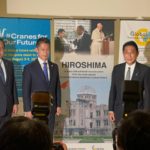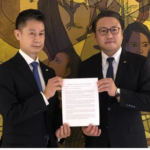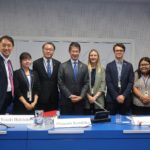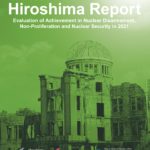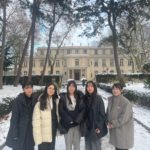Hiroshima Report 2023Special Message: The Tenth NPT Review Conference
Ambassador Gustavo Zlauvinen
From the very beginning, the Tenth Review Conference of the Parties to the Treaty on the Non-Proliferation of Nuclear Weapons (NPT) faced tremendous challenges. In particular, the growing frustration felt by the great majority of States Parties due to the lack of real progress by the 5 nuclear weapons States on their nuclear disarmament obligations and commitments had brought the very “grand bargain bargain” that laid the basis of the NPT to an existential crisis. The adoption and enter into force of the Treaty on the Prohibition of Nuclear Weapons (TPNW) made the schism seemed even wider.
The hiatus imposed by the COVID-19 pandemic did not help either, as it exacerbated the belie belief that the nuclear-weapon states (NWS) were using the repeated postponements to avoid f acing a fierce criticism at the Review Conference. On the other hand, it provided an extra time to conduct several rounds of virtual consultations with all States Parties, both on procedural as well as on substantive matters. To keep momentum, United Natio ns Office for Disarmament Affairs (UNODA) performed a superb job by co-organizing a series of topical and regional webinars. But the option of conducting the Review Conference on a virtual or hybrid manner took most of delegations attention.
Faced with th e stern opposition from several Non-Aligned Movement (NAM) delegations and the Russian Federation, the option was finally abandoned. It proved to be the correct decision, as the crucial and complex issues at hand needed an in-person negotiation process in a “full -fledged ”, traditional approach.
When the restrictions imposed due to the pandemic were gradually being lifted, and the Review Conference was about to get its date confirmed, the Russian invasion of Ukraine dramatically changed the international sec urity environment added another complex challenge to the negotiations at the Review Conference. As President of the Conference,
I asked delegations to “encapsulate ” the fallout of the war to only those issues or actions directly affecting obligations under the NPT. However, this approach was not followed by delegations directly involved in the conflict. The threat of using nuclear weapons by the Russian authorities – denied by the Russian delegation, changed dramatically the negotiation process. On top of that, the Russian forces ´ attacks on, and taking-over of Ukrainian nuclear power plants worsened the situation, making it impossible for both sides to have even a minimum level of dialogue.
And yet, many other important issues needed and did manage to be discussed and negotiated under the three Pillars of the Treaty – from the validity of commitments undertaken at previous Review Conferences, to the modernization and expansion of nuclear arsenals, to negative security assurances and nuclear risk reduction, to the relationship between the NPT and TPNW, and the humanitarian consequences of nuclear weapons, to the growing risks of nuclear proliferation and regional matters such as the DPRK, the Middle East and the AUKUS project, to the International Atomic Energy Agency (IAEA) safeguards system, the Additional Protocol, nuclear safety and security, to supporting the entry into force of the Comprehensive Nuclear-Test-Ban Treaty (CTBT) and an early negotiation of a Fissile Material Cut-off Treaty (FMCT), to a new approach to fulfill the increasing demands for more and better access to the peaceful applications of nuclear energy.
The three Main Committees and the three Subsidiary Bodies, all chaired by exceptionally experienced and seasoned diplomats, fulfilled their responsibilities to both review the implementation of the NPT, and to consider concrete actions to further implement the Treaty’s obligations and commitments (the backward backward- and forward-looking approaches called for by the 1995 Review Conference). Not a single meeting allocated to the Main Committees or Subsidiary bodies was cancelled – a true reflection of the commitment and intensity with which all delegations fulfilled their part during the Review Conference.
No issue was left undiscussed, even in circumstances where divergences of positions made negotiations almost impossible.
Looking for a way to bridge those gaps, I asked the Finnish representative to convene a group of selected delegations to help charter what might be a possible language that could master consensus on the key issues. The group reflected the widest and most balanced representation among all regional groups, political groupings and positions, while keeping the number to a manageable size. The task was not easy, and the result was far from perfect. But it was an important step forward, and together with the language provided by the chairs of the Main Committees and Subs idiary bodies, I produced a draft that, I believed then, was the best chance at getting a final document by consensus.
After carefully listening to the reactions to the draft in the Plenary, I engaged in intensive one -on -one bilateral meetings with an important number of delegations – those that had expressed serious objections (the so-called “red lines”) on some elements of the draft.
In order to get them on board, I had to show some flexibility by incorporating few changes to the draft reflecting, as much as I could, the most problematic “red lines” for each delegation. But I couldn’t accommodate all of them, as many were in direct collision with other delegations’ positions. After that, I submitted an amended draft reflecting my best effort of a compromise language, in the understanding that it would make all delegations “equally unhappy ”, but not to the point of blocking consensus.
On the last day of the Conference, I got confirmation from those delegations that I had engaged with, either at their own or my request, that they would go along with the revised final document. But the Russian delegation gave me a last-minut e hint that they would not support it. In a tense meeting with the Russian delegation, they explained that they would have to block consensus unless I introduced very specific language reflecting Moscow’s position on key issues related to the war in Ukraine. Although from day one of the Conference I had received strong demarches from the Russian delegation regarding those issues, I had done my best to accommodate some of them – what themselves called the “black lines ”. The rest of Russia Russia’s demands were impo ssible to include as they commanded no support from any other delegation – quite the opposite, they had been fiercely objected by an important number of State Parties. I had already taken a huge political risk by accommodating Russia’s “black lines ”, and I had been given the impression that it was sufficient for them not to block consensus. But it was not the case. Either my previous assessment had been off the mark, or they had changed their position. Whatever had happened, it was very clear then. They dem anded all lines – black and red, be incorporated into the document.
After careful consideration of the options with the Secretary-general of the Conference, I decided to submit my draft outcome document to the Plenary, for action, without further modification. The Russian delegation objected it on the records, and I had no choice but to change the final document into my own’s – the “President’s document” instead of the “Conference ’s final document”.
And yet, before closing the Conference, I managed to get all delegations adopt by consensus a formal decision that establish, for the first time in the NPT history, a working group on strengthening the review process. I believe that, under the difficult circumstances we faced, it is a small but concrete step for ward. It is now up to States Parties to use it wisely. I hope it can be the first step for new, more creative approaches during the next review cycles, such as on better defining the reporting obligations by the nuclear weapons states (including informatio n on their nuclear arsenals); working on identifying, as a community, practical steps on nuclear risk reduction; negotiation on a Treaty on nuclear security assurances, and working on innovative actions to further promote the use of, and cooperation on peaceful uses of nuclear energy.
Many believe that we didn’t succeed because States Parties did not agree on a final document with concrete steps, such as establishing benchmarks and timeframes for actions on nuclear disarmament. That is still a high challeng e, and it will require political will, and pressure from all States Parties. But we didn’t fail either. The fact that all delegations, but one, were ready to agree on an outcome document that reflected, imperfectly as it was, a minimum understanding of where we stand, reflects that the community of interests that binds the States Parties together is still valid. By doing so, we managed to avoid a “systemic failure ”. Let ’s hope the international security circumstances and the political will by the nuclear nuclear-weapons states would allow the Eleventh Review Conference pick up from where we left – after all, it is a continuous work – and agree on real progress, the very one that the great majority of States Parties to the NPT so demand, and so much deserve.



